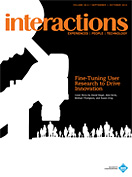Authors:
Robert Phillips, Dan Lockton, Sharon Baurley, Sarah Silve
Investigating how people understand the systems around themfrom technology to democracy to our own bodiesis a common research goal across many disciplines. One of the practical aims is uncovering differences between how people think systems work and how they actually work (particularly where differences can cause problems) and then addressing them, either by trying to change people's understanding or by changing the way people interact with systems so that this better matches people's understanding [1]. Being able to say that you understand a system is essentially saying that you have a model of the system [2]. In HCI and…
You must be a member of SIGCHI, a subscriber to ACM's Digital Library, or an interactions subscriber to read the full text of this article.
GET ACCESS
Join ACM SIGCHIIn addition to all of the professional benefits of being a SIGCHI member, members get full access to interactions online content and receive the print version of the magazine bimonthly.
Subscribe to the ACM Digital Library
Get access to all interactions content online and the entire archive of ACM publications dating back to 1954. (Please check with your institution to see if it already has a subscription.)
Subscribe to interactions
Get full access to interactions online content and receive the print version of the magazine bimonthly.






